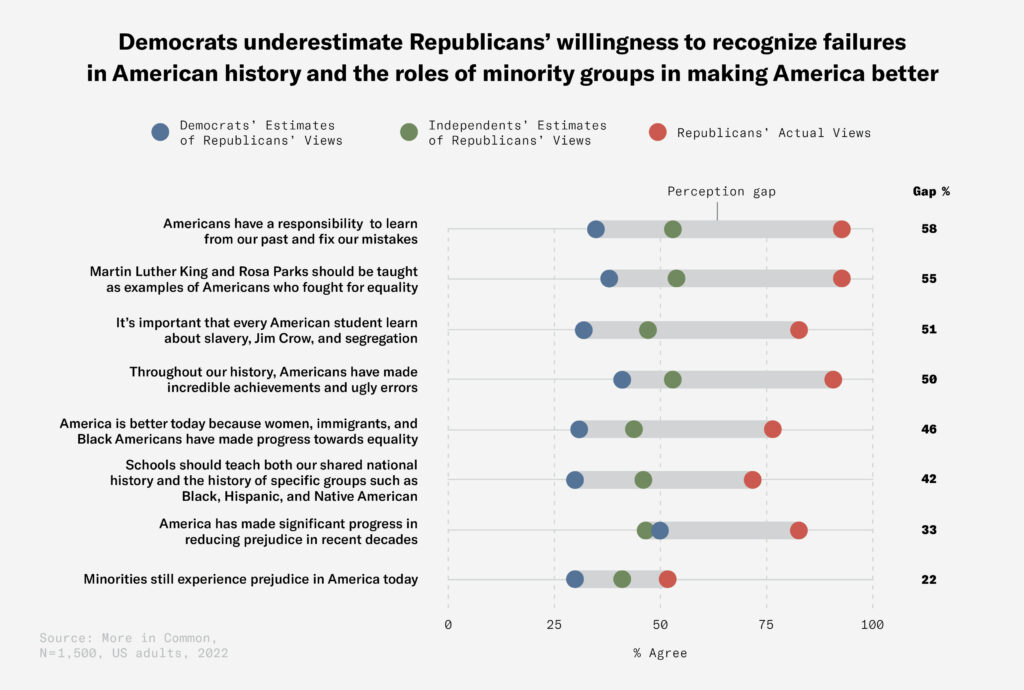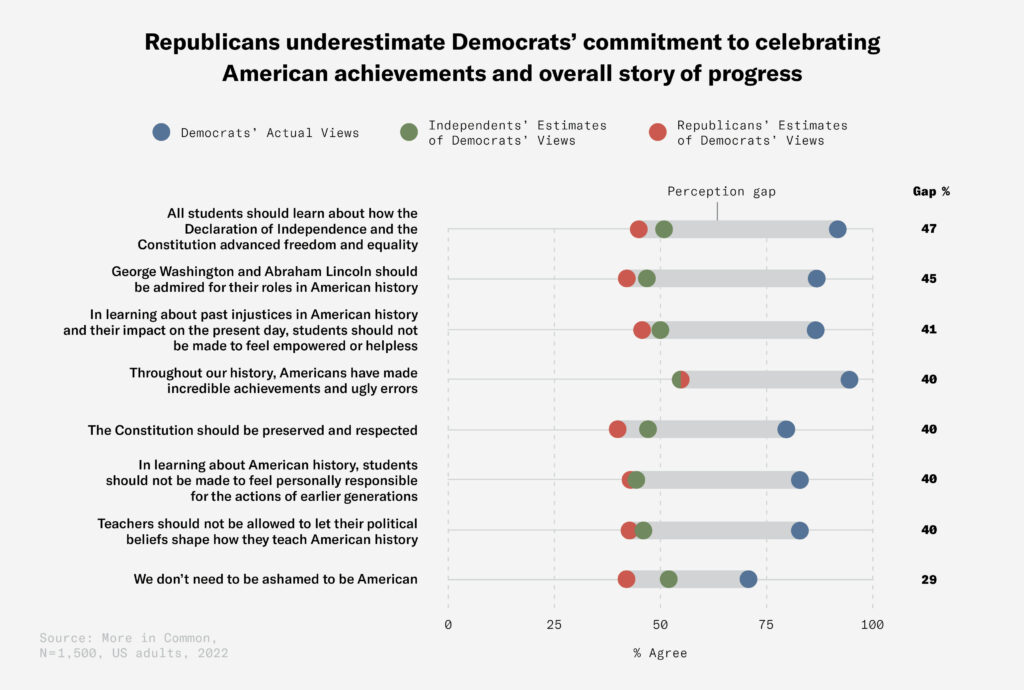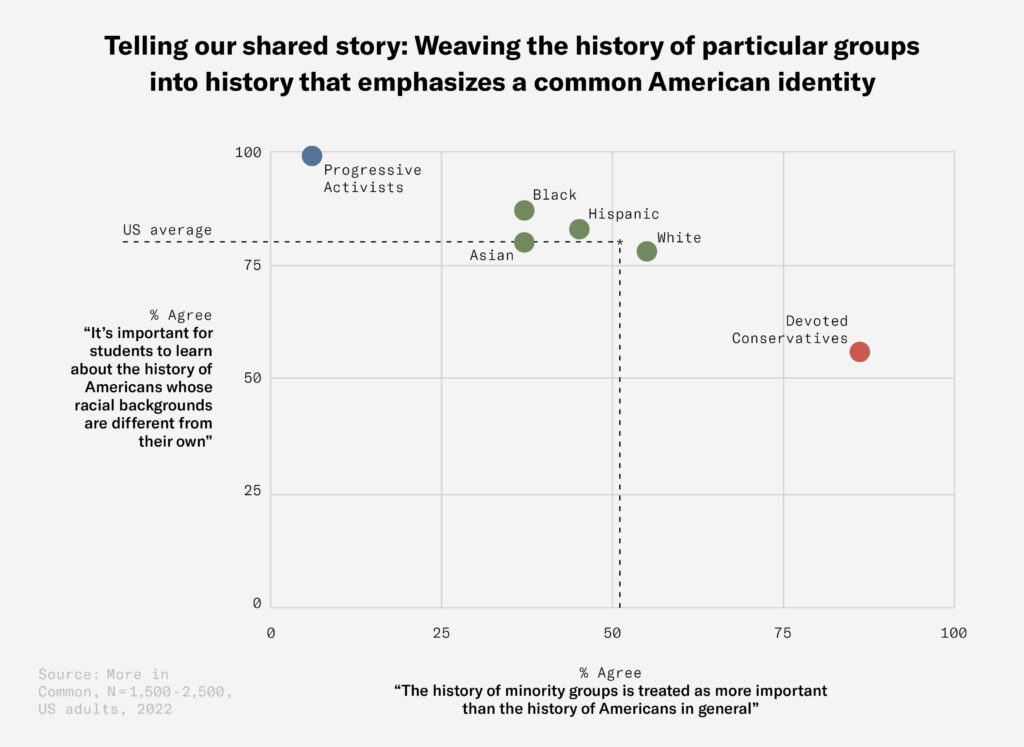December 16, 2022
New Report Released: Defusing our U.S. History Wars
More in Common US

Summary: More in Common US recently released their latest report, Defusing the History Wars: Finding Common Ground in Our Shared National History, which explores Americans’ views on topics central to today’s “history wars” and finds that these battles are being fought largely between imagined enemies.
What we found in our year-long study involving thousands of Americans is that most people want to teach a national history that includes both the inspiring and the shameful truths and that allows students to learn from the past without feeling guilty or disempowered.
The problem? Despite the agreement on what to teach, the study found that Democrats and Republicans alike grossly overestimate whether members of the opposing party hold extreme views on these topics. This is called a ‘Perception Gap’—the gap between what we imagine an opposing group believes and what that group actually believes.
Have a minute? Watch an overview of our report.
Many Republicans believe most Democrats want to teach a history defined by shameful oppression and white guilt. Many Democrats believe most Republicans want to focus on the white majority and overlook slavery and racism. But we found that both impressions are inaccurate. For example:
📊 About twice as many Democrats believe students should not be made to feel guilty or personally responsible for the errors of prior generations than Republicans think (83 percent versus 43 percent).
📊 The proportion of Republicans who agree Americans have a responsibility to learn from our past is three times more than Democrats perceive it to be (93 percent versus 35 percent).
📊 More than twice as many Democrats believe George Washington and Abraham Lincoln should be admired for their role in history than Republicans think (87 percent vs 42 percent).
📊 Almost three times as many Republicans believe Martin Luther King Jr and Rosa Parks should be taught as examples as someone who fought for equality than Democrats think (93 percent vs 38 percent).


Where We Disagree
Our research did find points of disagreements, mostly over two questions: first, how to draw connections between the past—especially past injustices—and present-day America, and, second, over the degree of emphasis given to the histories of minority groups.

Our research suggests that while there are genuine areas of substantive disagreement about how to teach American history, these debates are currently framed by segments holding the most extreme views, despite the fact that these two groups comprise only 14 percent of the U.S. adult population. This dynamic leads to situations in which communities spend time fighting imagined enemies instead of grappling with the substance where there is actual conflict.
Do you have a Perception Gap? Take our quiz and find out.
Action Steps
Given the enormity and complexity of our national story, teaching it has always been and likely will always be a subject of important and fraught debates. Our data shows that today we have much more overall agreement on how to teach history than we had in the past. But in a polarized political and media landscape, we currently do not see this common ground.
As we turn the page on a new year, we can use our findings as an opportunity to imagine something brighter and recognize that we can start building a better future through meaningful conversations about how to teach our past. Here are some things each of us can do right now:
👉 Read our recommendations aimed to generate better conversations, dialogue, and debate. Are there any you can incorporate into your work or life?
👉 Hear perspectives from interviews with Americans across the country. Do any of these resonate with you?
👉 Share our findings on social media. All graphics on our website are downloadable and sharable on social media. Tag us!
👉 Download and read the full report. What insights did you find surprising?
👉 Check out Defusing the History Wars in the news.
🗞 The Atlantic: How False Beliefs Propel Cultural Conflict, by David French
🗞 Washington Post: We keep moving from one wrong fight to another. Here’s how to stop., by Amanda Ripley
🗞 Education Week: Americans Do Disagree on How History Should Be Taught—But Less Than They Think, by Sarah Schwartz
🗞 The Bulwark: Do Americans Even Know How to Agree?, by Mona Charen
🗞 Persuasion: The Curriculum Wars Are Based On An Illusion, by Seth Moskowitz
🗞 Washington Times: Democrats, Republicans seem to mostly agree on race in history classes despite mutual misjudgment, by Sean Salai
🗞 Fox 5 Washington D.C.: #TheFinal5: Breaking down “The Perception Gap”
🗞 The National Desk: ‘History wars’ in schools largely between imagined enemies, study finds, by Cory Smith